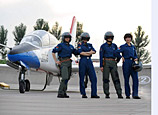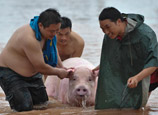
Urban canines
"I strongly object to keeping aggressive dogs in cities, where the population density is high. Raising such dogs is just like keeping a tiger around," Yang Yang, an experienced animal rights campaigner, told the Global Times.
"Many owners of aggressive dogs have told me that their dogs haven't caused any trouble. However, I know from experience that those breeds are not controllable. Once they start biting, it is useless to try to stop them," said Yang. "These dogs shouldn't have been introduced in the first place. The rich just want to show off by spending 1 or 2 million yuan on a dog."
Yang's words were echoed by Zhu Shuilin, a vice president with the Zhejiang Small Animal Protection Association, who said the whole process, covering both breeding and selling, should be strictly regulated. "Local governments support raising Tibetan Mastiffs, but have they considered who the dogs will be sold to?"asked Zhu, adding that his comments have made him the subject of online criticism from fans of the breed. "People have preferences when it comes to breeds of dogs, just like they do for cars. But there should be a proper place to keep such dogs, therefore, we suggest not keeping aggressive dogs in the city," said Zhu.
Seizing dogs
Kunming, the capital of Southwest China's Yunnan Province, instituted bans on certain kinds of dog on October 1, 2008. Altogether, 33 kinds of dogs are banned in the city, but it is still common to see these dogs openly sold in several dog markets, according to the Chuncheng Evening News.
Regulations implemented in 2003 banned 41 breeds of dog from Beijing, but despite the rules many people bought these dogs. The regulation requires aggressive dogs and large dogs to be tied up or kept in cages, and not walked outside. Breaking the rules can earn fines of up to 5,000 yuan and dogs being confiscated, as well as a five-year ban on dog ownership.
When the authorities attempted to enforce the ban in June of this year, raiding homes and seizing illegal dogs, the public outcry made international headlines. One dog owner, Wang Yi, a resident in Daxing district, told the Global Times that since the crackdown he has only taken his dog outside at night. "It didn't bite anybody or other dogs, but now it has to spend more time lonely at home," he said.
Liu Ning, a member of the Chinese People's Political Consultative Conference, told the Beijing News that Beijing's current regulations have worked. "Dog owners may know that large dogs aren't always dangerous, but those who don't own dogs might not. It's easy for children to get hurt," he said, adding that separating dogs by size was understandable.
Zhu, however, does not agree. He pointed out that small dogs were often more aggressive, and said regulations were out of date. "The guiding principle of the regulations, first enacted in 1995, was to restrict the number of dogs by setting the management fee at 5,000 yuan. But changing living standards have made the situation more complicated."
"To tell if a dog is dangerous, we should judge by whether they are controllable instead of strength. Some dogs like German shepherds have a lot of power, but their temperament can easily be controlled after training by handlers and owners," said Yang




















![]()
